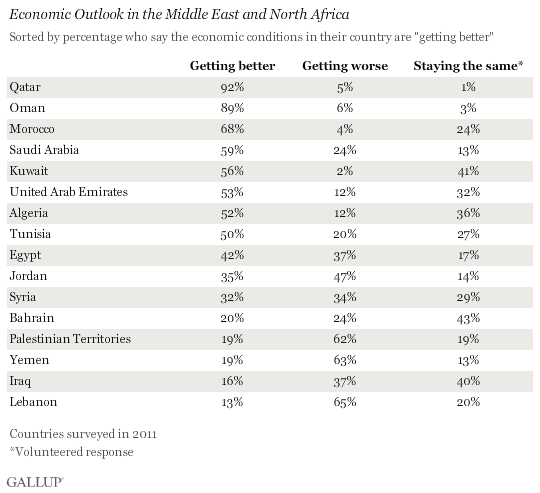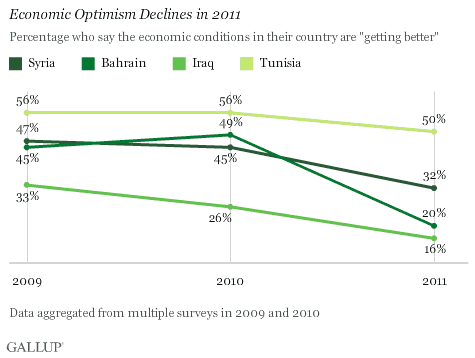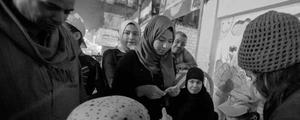WASHINGTON, D.C. -- About 9 in 10 residents of Qatar and Oman say their national economy is getting better, making them the most optimistic among the 16 countries Gallup surveyed in the Middle East and North Africa in early 2011. Residents of Lebanon, Iraq, Yemen, the Palestinian Territories, and Bahrain are among the least optimistic.

The 92% of Qatar respondents who believe their national economy is getting better likely reflects years of strong economic growth in the country that accelerated in 2011. Oman respondents' relatively high optimism -- 89% -- is more surprising given the country's heavy dependency on diminishing oil resources and decreasing reserves. Some of this optimism may reflect the highly educated makeup of the survey sample in Oman.
Lebanese are among the least optimistic in the region, with 13% saying their economy is getting better, and among the most pessimistic, with 65% saying their economy is getting worse. Although optimism in Lebanon is low, the 13% who say the economy is getting better represents an increase from late 2010 when 7% said their economy was getting better. This suggests that even though Lebanon essentially avoided the global financial crisis, political instability continues to cloud its residents' economic outlook.
One in five or fewer residents of Iraq, the Palestinian Territories, Yemen, and Bahrain say their national economy is getting better.
Economic Optimism Declines in Key Countries
While economic optimism in the Palestinian Territories and Yemen has not topped 20% for several years, 2011 marks the first time the percentage of those who say their national economy is getting better has dipped this low in Iraq and Bahrain.
It is interesting to note that Syria, where protests were intensifying at the time of the survey, is the only country where residents' outlook for their economy was evenly split: 32% say their economy is getting better, 34% say it is getting worse, and 29% say it will stay the same. Before 2011, Syrians were comparatively less pessimistic about economic conditions and never this divided.

Of the North African countries surveyed, residents of Morocco are the most optimistic, with 68% saying their economy is getting better and 4% believing it is getting worse. Tunisians and Algerians are considerably less optimistic, but at least half of the residents in each country think the economic situation is getting better.
Implication
Gallup's surveys illustrate the lack of optimism that many in the Middle East and North Africa have in their economic conditions getting better -- particularly those in countries that are experiencing a great deal of political conflicts and civil unrest. This pessimism is likely contributing to the instability, but it also may be a byproduct.
For complete data sets or custom research from the more than 150 countries Gallup continually surveys, please contact SocialandEconomicAnalysis@gallup.com or call 202.715.3030.
Survey Methods
Results are based on telephone and face-to-face interviews with approximately 1,000 adults in each country included in this analysis, aged 15 and older, conducted between February and June 2011. Surveys were conducted via telephone only in Qatar and Oman. For results based on the total samples, one can say with 95% confidence that the maximum margin of sampling error ranged from a low of ±3.3 percentage points to a high of ±3.8 percentage points. Special survey notes: Surveys in Arab Gulf countries were conducted with nationals and Arab expatriates; non-Arabs were excluded. In Algeria, the sparsely populated Deep South and governorates that represent security risks within Algiers were excluded. Oman's sample skewed higher in education.
The margin of error reflects the influence of data weighting. In addition to sampling error, question wording and practical difficulties in conducting surveys can introduce error or bias into the findings of public opinion polls.
For more complete methodology and specific survey dates, please review Gallup's Country Data Set details.
